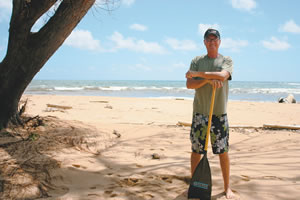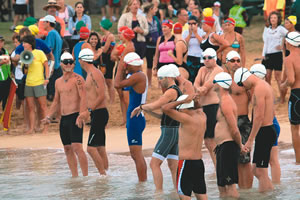Triathlon Funds Benefit Keiki Fitness

Veteran paddling coach Brian Curll / Amanda C. Gregg photo
With the cost of traveling to other races rising, Brian Curll and friends decided to start a triathlon on Kaua’i that would benefit local kids
It was during a discussion after the Moloka’i Hoe in 2008 that the idea for the TriKaua’i triathlon came to be. That’s when longtime canoe paddler Brian Carter and Brian Curll, veteran paddling coach and Hui O Mana Ka Pu’uwai Outrigger Canoe Club president, got together and decided to bring a triathlon to Kaua’i.
Curll says the conversation had centered on the cost of interisland travel for races getting as high as $600 a pop. “And we were like, ‘How hard can it be?'”
Of course, it did turn out to be a challenge, but with the help of friends and volunteers they were able to pull it off – in three weeks. And so the first TriKaua’i was born in November 2008, just after the Molokai Hoe. Unlike for-profit triathlons, this event, an official 501(c)(3) designation, is intended to raise funds for Kaua’i families and nonprofit entities.
“We realized we needed a triathlon on Kaua’i,” says Curll, a grant writer who has been on Kaua’i for 15 years. “And if we didn’t do it here, we wouldn’t have one.”
Those ready to participate in this year’s TriKaua’i can feel good not only about doing something healthy, but for being part of something that endeavors to help others, with money raised used to sponsor the Pu’uwai Kapa’a Warriors varsity and junior varsity outrigger paddling canoe teams, and Kukui’ula’s spring and summer programs for youths ages 8 to 18. An additional 10 percent goes to Kaua’i Bikes for Kids, which provides education, bicycles, helmets and safety vests to fifth- and sixth-graders to teach them safe bicycling habits.
Race director Curll, who serves on Mayor Bernard P. Carvalho’s board of directors for “Get Fit Kaua’i,” is no stranger to rallying volunteers for a good cause. For more than a decade he has conceived of and coordinated several nonprofit fundraisers, including the Bright Stars race, a double-hulled canoe competition for the mentally challenged. Those who participated included quadriplegics and autistic children, so “anyone and everyone would get a chance” to feel what it’s like to race in a canoe. The race course began at the mouth of the Wailua River up to the Hawaiian Village and back, and then finished at Smiths Marina.
And that is just one of his many success stories.

Participants prepare to start last year’s race / Nathan Sebastian photo
“We have worked hard here on Kaua’i to develop locally run events to raise funds for our Kaua’i nonprofit organizations for more than 15 years,” Curll says. His fundraisers have resulted in more than 125,000 pounds of food being donated to the homeless and those in need through Kaua’i Independent Food Bank.
Other beneficiaries are Surfers Healing (which teaches autistic children to surf) and The National Guard Family Fund (which provides food for the families with young children of U.S. Guardsman on Kaua’i who are presently serving their country off-island).
This year Curll expects from 125 to 150 to participate, although that doesn’t necessarily mean a higher number won’t show up, if previous years are any indication.
“People are notoriously late on Kaua’i,” he explains.
The first year hardly anyone had registered, though approximately 300 participated, Curll says.
“It was, like, nobody registered and there were some 300 people all in line,” Curll recalls. “It was pitch black, 5 a.m. We couldn’t see anything and it took an hour and half to two hours to do registration.”
But the event went off without any other hitches, with multiple relay teams participating along with some folks finishing the entire triathlon solo.
“Eighty percent of people that time were teams,” Curll says. “Some would get done with the swim and were exhausted after they were tagged off. But after their teammates finished the bike ride, they were rested, energized and wanted to do the run.”
Curll says the next year many relay participants realized they’d prefer to complete two legs rather than just one. “They said, ‘I’ll do the swim and the run and you do the bike in the middle.'”
Since that inaugural event, many of the wrinkles have been ironed out, though it still can be a tough sell to convince everyone to pre-register.
“We try to explain that we can’t make random shirts. You need to register so we have enough food,” Curll says, laughing. “People do what they do.”
He adds that might just be part of the fact that TriKaua’i is more of a low-pressure event when compared to other races, and is designed to cater to a broad range of athleticism. That’s why some can relay, and that’s also why there aren’t qualifying requisites.
“This is really a stepping stone for people on Kaua’i to try new things and get into contact with their inner athlete,” Curll says.
Not that there aren’t hard-core athletes involved. Those in the running world likely know avid runner Liane Rivera (who’s volunteering to be the run and 5K supervisor), while those who paddle canoe will likely recognize the names of volunteers Jon Kegle, Mike Pemberton, Brandon and Sonya Raines, and Fran McDonald (devoted OC-1 and six-man paddlers) along with volunteer swim supervisor Trevor Ford. Others involved include volunteer coordinator Tenley Ueda, bike supervisors Paul Arrigo, Mark Jacobson, and Larry and Gayle Bryan and swag supervisor Cynthia Dazzi.
TriKaua’i has something for everyone, from couch potato to hard-core athlete, and includes a 500- to 750-meter swim, 14-mile bike ride and 5K fun run or walk, with the idea being inclusive.
“We want to make this as encouraging as possible for participation,” Curll says. “If you need a mask and a snorkel, if you want a tandem bike, or if you get in the water and you need them to paddle you out to the next buoy because you’re having trouble, there’s no penalty. … This is your opportunity to try something, and we’re going to be there to support you.”
Registration closing date: April 8. Cost: $30 5K, $55 Military, $60 Solo, $90 Team. For more information, go to trikauai.com.



